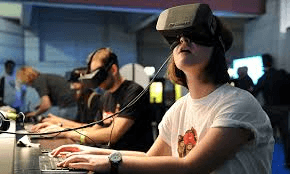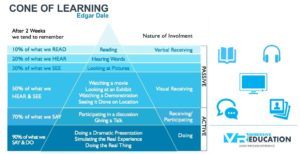Immersive VR Edcucation

How Virtual Reality will shift the classroom experience
Introduction
Virtual reality in its present incarnation is often thought of as a gaming device that isolates oneself in a digitally created world. However, new applications of this technology are proving that virtual reality has the ability to dramatically change the way we view content across a variety of fields and that it doesn’t necessarily have to be a solitary exercise. Within education, Immersive VR is one such company utilizing virtual reality to rework the current learning experience.
Immersive VR has launched first versions of two different tools – Lecture VR and Engage – that help transform the classroom experience. Lecture VR helps simulate a lecture hall n virtual reality, while simultaneously adding special effects (like images, videos and immersive experiences)[i]. These lectures are much more engaging for students – for example, imagine learning about the Apollo 13 mission from inside the space shuttle. Additionally, this product enables students and teachers to join from anywhere in the world, which has powerful implications for the future accessibility of education globally.
Engage gives educators the tools to create these immersive experiences. Without learning how to code, teachers can work with Immersive VR’s team to create their own lesson plans and transport their students across the globe[ii].
Value Creation
The main value creation from bringing virtual reality to the classroom will be benefits in education and improvements in student performance. First, people learn best through experiences or doing tasks themselves[iii]. Furthermore, these immersive experiences mean that students are engaged in the material and not distracted by the outside world. The ability to explore and provide a hands-on approach helps students better understand concepts and retain the information for longer. Finally, many students find it easy to understand complex theories and concepts when learning visually[iv].
Today’s education system focuses mostly on reading and listening. By forcing children to be active participants in their education, you enable them to learn more without consciously realizing they are doing so. By making education an activity, rather than a chore, VR has the possibility of revolutionizing the context in which we learn, which has major monetary benefits for society in the future.
Value Capture
Immersive VR, like most educational VR companies, relies on charging educators and school districts for use of their services. This is a difficult proposition – the technology is expensive and many of these educators are already struggling to be in line with budgets given their current funding levels. Immersive VR and other education technology companies will need to develop innovative marketing techniques to encourage VR adoption in schools and higher education[v].
While this technology may seem expensive currently, it is similar to how people viewed PCs back in their early days of adoption (although early PCs were comparatively even much more expensive). Over time, as parents see the impact on their children, it will become more widely demanded and adopted. Furthermore, when you consider the possibilities of VR – transporting an entire classroom (who would never be able to afford the journey) to the Louvre to view the Mona Lisa – the price begins to seem much more reasonable.
Future Growth Opportunities
I think it is hard to overstate how exciting the growth potential is for educational virtual reality. This technology has the power to completely eradicate boundaries – allowing a classroom in the rural South to meet a similar classroom in India or Mexico, enabling global access to world renowned lecturers, transporting students anywhere in the world. Immersive VR is primed to build upon their current product to make education even more exciting, limitless and rewarding in the future.
[i] https://touchstoneresearch.com/the-top-10-companies-working-on-education-in-virtual-reality-and-augmented-reality/
[ii] https://techcrunch.com/2016/12/16/what-the-coming-educational-vr-revolution-teaches-us-about-the-techs-future/
[iii] http://immersivevreducation.com/
[iv] https://www.vrs.org.uk/virtual-reality-education/benefits.html
[v] https://techcrunch.com/2016/01/23/when-virtual-reality-meets-education/





Great post. I think the value potential for VR in education is huge, but I wonder about the cost of developing content for these platforms. It seems like the amount of time required to generate a teaching plan is much higher, and unless Immersive VR can really find a way reduce the time it takes to develop content, adoption will be slow.
Great post. I totally agree with David above; I think the hardware side that is, performance-wise, sufficient for education will arrive fast and will commoditize just as fast. Real value will be in content – and I just wonder how differentiated/high-margin that can be in the education industry.
Thank you for such an insightful post! One of your suggestions in the future growth opportunities really struck me – the ability to meet a classroom in another part of the world. I recall participating in a pen pal program when I was in 4th grade and thoroughly loved writing letters back and forth with another 4th grade girl across the US. I found it so interesting to compare our experiences, I can only imagine how incredible an experience it would be to interact virtually with a student of a similar age in another part of the world! This technology could go beyond closing the education gap and could improve awareness of other cultures, reduce stereotypes and discrimination and improve global relations. I know I have been iffy myself on the expansion of online education as it threatens institutions like HBS, but this is the first time I have really come to realize how impactful such education can be to improving global relations. Thanks again!